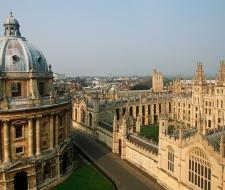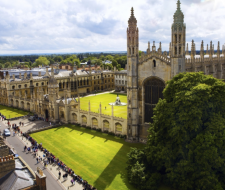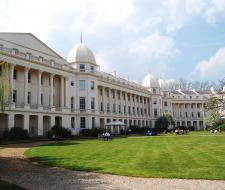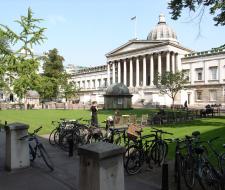Higher education in England UK for international students
- Education information
- Preparation courses for admission to TOP-100 UK universities
- Studying programs in 100 best UK universities
- Bachelor's and Master's degree in England
- How to choose the right university in Great Britain?
- The most famous universities in the United Kingdom
- Secondary education in Britain
- Literature and references
This content was developed with active participation of Sarah Jayne Blakemore.
In the process of preparing the material, we referenced the following sources:
- https://en.wikipedia.org/wiki/List_of_universities_in_the_United_Kingdom
- https://www.timeshighereducation.com/wikipedia-ranking-world-universities-top-100.
-
 from 25740.00 £ / yearApply with documents
from 25740.00 £ / yearApply with documents -
 Awarding body of University of the Arts London and Trinity College London
Awarding body of University of the Arts London and Trinity College London United KingdomCambridgeCurrently watching: 6from 14490.00 £ / semesterApply with documents
United KingdomCambridgeCurrently watching: 6from 14490.00 £ / semesterApply with documents -
 from 2450.00 £ / yearApply with documents
from 2450.00 £ / yearApply with documents -
 #45 in the world
#45 in the world United KingdomLondonCurrently watching: 7from 21570.00 £ / yearApply with documents
United KingdomLondonCurrently watching: 7from 21570.00 £ / yearApply with documents -
 #40 in the world
#40 in the world United KingdomLondonCurrently watching: 10from 5170.00 £ / termApply with documents
United KingdomLondonCurrently watching: 10from 5170.00 £ / termApply with documents -
 #2 Business School in Europe
#2 Business School in Europe United KingdomLondonCurrently watching: 7from 33600.00 £ / yearApply with documents
United KingdomLondonCurrently watching: 7from 33600.00 £ / yearApply with documents -
 from 15220.00 £ / yearApply with documents
from 15220.00 £ / yearApply with documents -
 from 29500.00 £ / yearApply with documents
from 29500.00 £ / yearApply with documents -
 from 20210.00 £ / yearApply with documents
from 20210.00 £ / yearApply with documents -
 from 20500.00 £ / yearApply with documents
from 20500.00 £ / yearApply with documents
Alternative destinations
Education information
Undoubtedly, the world recognized leader in the quality of education is England. In order to enter a British university, foreign students need to make considerable efforts. The main difference between foreign and British educational systems are required subjects and duration of studies. Higher education in the United Kingdom will take longer period than studying in other countries.
In the United Kingdom, compulsory education lasts until 16 years old. After that students enter the A-level programme and prepare for higher education in England. Two years of classes are focused on more detailed study of several subjects that are necessary for entering university.
It is worth noting, the excellent way for a foreign student to comply with necessary requirements of the British educational system is to undergo a specialized preparation programme. It will allow student to improve his English skills in a short period of time, develop subject terminology, identify his academic weaknesses and fill gaps. Pre-university educational programs will also help study 3-5 essential disciplines and pass entrance exams.
In order to enter institution of UK higher education and receive prestigious degree in England, foreign students can choose from three main options:
- Finish pre-university or diploma programme in Great Britain;
- Be transferred from a university in their home country to a university in the United Kingdom. However, it will be necessary to study for a year more;
- Obtain a home country diploma and later enter English master’s degree programme.
Requirements for applicants at English universities
The basic requirement for admission to English universities is the GCSE certificate. In order to be sure of your admission, at least 5 subjects according to the GCSE programme should be passed for an excellent mark (A* - according to the British system). Moreover, universities attentively check the command of English. Students should be prepared to take the international IELTS exam (the basic requirement for universities starts from IELTS 5.0-5.5).

The entire package of documents is submitted through a special general online system called UCAS. It is a big advantage – applicants can submit documents to several universities at once, usually no more than 6. Undoubtedly, it will increase chances of enrollment, as there are several alternatives.
It is essential to note that most privileged and elite universities like Oxford, Cambridge, London School of Economics and Political Science, etc., may require a personal presence when submitting documents, a personal interview and passing additional admission tests.
You have to complete the application forms and upload documents to the UCAS system as soon as possible - at least six months before the expected start of studies.
The main rule: the more privileged and prestigious institution is, the sooner you need to start application process.
Preparation courses for admission to TOP-100 UK universities
There are two types of programs for foreign students that allow to prepare for entering English university in the most effective way. An excellent GCSE certificate and high results of a language test will help enter either preparation course at university, or programme of a national center for foreign students preparation.

In addition, there is University Foundation Program (UFP) programme which allows to quickly improve your English language skills and adapt your own knowledge to the educational system in the United Kingdom. Duration of UFP is 1-1,5 years.The programme introduces foreign students to British studying methods and gives the basic knowledge of necessary subjects. Actually, full course of preparation for students is held on the basis of selected university. In this way, students can get acquainted with the students’ residence, learn more about their future teachers, select the most interesting communities and clubs, coteries.
A significant number of private institutions in the United Kingdom reserve places in advance for their students. So in order to be ensured of getting guaranteed entry,students must show sufficient English test scores and pass examinations on subjects. The choice of subjects is determined by the requirements of the university, but among the disciplines there are lectures, practical classes and seminars. Programs offer mandatory modules and selective ones.

The next pre-university programme for foreign students is the Certificate of Higher Education programme. This newly developed complex programme allows students to enter the second year of the university. The Certificate of Higher Education indicates that the student has an elementary level of higher education and is able to continue his studies Bachelor's level.
In order to enter UK higher education institutions of the top-level list, it is essential to have advanced level of pre-university education. It can be achieved with the help of A-level programme. During two years of preparation students intensively pass up to 7 profile subjects. The results of examinations on these disciplines are later considered as an entrance test to the university. Many leading universities in the United Kingdom take the national A-level programme as an indispensable condition for receiving higher education in England.
The international standard programme International Baccalaureate (IB) is also among the leaders of pre-university courses. Nowadays, IB programme is recognized in more than 100 countries around the world. Therefore, it will allow to choose any prestigious high school and university of the world. During two years of preparation, students are compulsorily study 3 subjects in detail and other 3 - on general level. All students learn the theory of knowledge as a separate subject that develops self-study skills. Additionally, there are various elective disciplines.


How to get into the top British university? If you finish high school in the UK, will it increase the chances of entering Oxbridge or Russel Group?
Focus primarily on your priority subject and develop your knowledge in this area to the maximum before applying. Undergraduate in the UK lasts only 3 years (unlike many other countries), so the specialization will begin immediately. In the U.S., for example, you first take many different modules (in your first year) and then you begin to specialize more narrowly. In the application process, you will have to show the admission committee your interest and knowledge in a particular subject, that you additionally studied it outside the school course, read various materials and studies. This will show your willingness to study in depth.
Yes, an international school diploma/certificate is respected all over the world and is often used for admission - however, not every qualification is considered the equivalent of an A-level, so it is better to clarify this point with a particular university. A-level, of course, will be most useful, but the International Baccalaureate IB, as well as the American AP and SAT standards, are also respected and appreciated.
Studying programs in 100 best UK universities
Students, that are already studying in foreign universities, can also continue their studies in British universities. The educational system in the United Kingdom allows to be transferred to a lower course from a foreign university. In addition, foreign students can enter master's degree after graduating from homeland university.
Firstly, it is essential to note the classical Bachelor's programme. It is the most popular course of higher education in the United Kingdom. Actually, Bachelor's degree can be obtained in 3-4 years, but for certain specializations (for example, medicine, architecture) the time of studies can be increased to 6 years. The curriculum includes seminars, practical lessons, and theoretical studies - but, in general, there is much more practical work. In addition to the compulsory block of disciplines, each student chooses elective disciplines. For example, if the study is conducted at the Faculty of Law, in addition to the main area of law, the student can improve knowledge of taxation, international law or M&A legislation.

The Diploma programme will help foreign students to continue studies in another country. Moreover, it will thoroughly acquaint foreign students with life in Great Britain and requirements in British universities. Studying Diploma programme, the student passes the first year of bachelor's degree and improves command of English. Foreign students get acquainted with the curriculum, adapt to local mentality, immerse into the linguistic, cultural and academic environment.
It is possible to apply for a Diploma programme with 75 – 85 points for the TOEFL language exam (or IELTS 5.5) and excellent GCSEcertificate. After this programme, the student moves to the second year of undergraduate degree in the specialization and receives a higher education in the United Kingdom.
Business education in the United Kingdom is available to holders of the foreign diploma of the highest preparation level (equivalent to a Bachelor's degree in England). Those wishing to obtain a doctorate degree or master's degree can complete business educational programs for Pre-MBA and Pre-Masters courses. Studying these programs lasts usually for 1-3 terms. Duration depends on the level of English proficiency and chosen occupation.
It is possible to apply for business programs after receiving 6.0 on the IELTS test or 550 TOEFL points. For admission to the Pre-MBA programme it is mandatory to have at least two-year experience of leadership work.

The Diploma programme allows specialists with a bachelor's degree in the foreign country to obtain a master's degree. The peculiarity of the programme is a change in the specialization. It means that, if a specialist decided to change qualification and chose another professional specialization, he should take a 6-12-month Diploma programme.
Also, a mandatory condition for successful study in the master’s degree programme is an active scientific and research work. It is impossible to get a master’s degree having solely finished general lectures and seminars. Two semesters of education allow you to master the basic knowledge of new specialization and submit documents to the Master's programme of English university. In order to enter the programme, you will need 70-80 points for the TOEFL language (IELTS 5.0 - 5.5) and a foreign university diploma.
Bachelor's and Master's degree in England
Higher education in England has long and rich history. Since the foundation of Oxford and Cambridge in the XII-XIII centuries, British universities have always been among the most respected and prestigious. Nowadays, foreign students dream about entering universities in Great Britain as they provide high-quality education that is appreciated around the world.
Universities in England offer a variety of specializations and qualifications. It is worth noting that the educational system in Scotland is slightly different from the English system. Scottish students can get Bachelor's degree studying for 4 years. Also, apprenticeship is obligatory for many respected educational institutions. Often it is a practical stage of education that increases the standard bachelor's degree programs for 1 year. A longer practice is required for special programs: architecture, medicine, dentistry. Students of these specializations must study for up to 7 years. In England, a master's degree can usually be obtained in 1-2 years, depending on the specialization of the programme.

An essential aspect of obtaining higher education in England is its high price. The cost of the courses corresponds to prestige of the university, duration of the education and kind of chosen specialization.
Despite high fees, it could be very difficult to enter one of TOP-100 British universities. English diploma is highly valued in all countries and allows graduates to build a brilliant career abroad. Actually, students pay 9 000 – 13 000 GBP for an academic year.
What are the most expensive occupations?
- Lawyer
- Physician
- MBA
In order to get these specializations, people should pay at least 21 000 – 35 000 GBP a year. Also, British universities provide for other expenditures: registration fee, deposits, education materials, as well as accommodation and meals, additional lessons and excursions, personal pocket expenses.
However, it's important to note that there are a variety of scholarships and financial grants for foreign students that can cover a significant part of education fees. Do not neglect them as higher education in the United Kingdom is a rather costly thing.

Students entering British universities should take into account that, most likely, studying abroad will be much more difficult than in homeland. For example, at most bachelor's degree programs, no more than 4-5 subjects are studied in each semester, but at the end of the semester students will have a large complex test on all disciplines. Moreover, every 3 months there will be a fairly complex test of the general level of knowledge.
Remember that cheating in the United Kingdom is strictly punished. You may see your name on the list of expelled without the right to restore on the next day after cheating. Bribes in English universities are also impossible, and the punishment for teachers is much stricter than for students. You simply will not be able to find a teacher who would agree to risk his career for a bribed exam. You should rely only on your knowledge and diligence!
How to choose the right university in Great Britain?
There are some tips that can help you to choose from TOP-100 universities in England.
- Study the profile and specializations, programs offered by different universities and colleges in the United Kingdom, and then select some options that are suitable for you;
- Explore the ratings from “The Complete University Guide” and “The Times Subject Tables” agencies;
- Determine the geographical location that is convenient for you, assess your ability to travel and proximity to airports and major cities;
- Examine scientific and material basis. Find out what opportunities are offered to students;
- Find out what kind of policy regarding foreign students the institution adheres, whether it is possible to receive a scholarship in your chosen specialization;
- Note that it is worthwhile to inquire about the results of the official audit of the Quality Assurance Agency for Higher Education;
- Find out what requirements students should meet. Decide whether you need to get some additional preparation in order to study in England;
- Analyze the costs for education and all additional courses (if necessary);
- Take care of the comfort of living; learn about living conditions in the residence if available and the requirements for students.

The most famous universities in the United Kingdom
Each student dreams about studying in top university that is respected around the world. There is a great deal of famous universities in the United Kingdom that have proven to be the best for many years.
- The Open University of Great Britain
This university was founded in 1969 by a personal decree of Elizabeth II. Nowadays, it is considered to be the largest educational institution in England. More than 200 000 people study here and the partner network is represented by institutions in 50 countries.

- University of Glasgow
It is one of the oldest universities in the United Kingdom, which began its work in 1451. Now it occupies the 4th place among the oldest universities in the world! It is included in the list of the best universities of the planet.

- Aston University
Founded in 1895, this university is considered to be the best in the United Kingdom for qualified medical specialists in various specializations.
- University of York
It was founded in Yorkshire in 1965. Classical education and high-quality teaching staff allowed University of York to quickly enter the TOP-10 of British universities, as well as TOP-10 research centers in England. It is worth noting very high level of graduates successful employment - more than 97% graduates find high-paying and prestigious jobs.

- Cambridge University
The legendary alma mater of the powerful ones of this world: politicians and rulers, kings, the elite of the modern world and Nobel laureates. Recognized as the best university in the world, today Cambridge includes 31 colleges where more than 19 000 students study.

- Oxford University
The oldest and the most prestigious university in the world. The date of its foundation is lost in the centuries, but teaching there was conducted already in the middle of the XI century. Oxford has incredible number of famous graduates, including the political, cultural, scientific elite of the modern world. Nowadays, Oxford University is a city inside the city which combines absolutely everything a person needs. The structure of Oxford includes 38 colleges, where more than 20 000 people study (about a quarter of them are foreign students).

- University of Manchester
The University of Manchester was founded in 1824. Today this university is the most rated among British university entrants. More than 500 different programs and courses are studied here. In terms of research potential University of Manchester follows immediately after Oxford and Cambridge.

- University of Leeds
Founded in 1904, today it is considered to be one of the largest universities in England. It is the best educational institution in the United Kingdom for studying foreign languages, chemical sciences, electronics and transport systems.

- University of East Anglia
It is an amazing university, founded in 1963. It is extremely popular among students from over the world due to unique combination of the highest rating in Great Britain and in the world with excellent quality of educational and research programs. At the same time, it offers comparatively low costs of education.

- University of Bath
A leading UK university with an international reputation for teaching and research excellence. It was founded in 1966 and since then it is among the national TOP-20 universities. It provides really strong teaching business disciplines, technical sciences. At the same time, it offers fairly democratic cost of study.

- University of Sheffield
More than 3 200 teachers, more than 35 000 students and the most active research work make this university one of the most significant in the United Kingdom. The annual grant for research is about 5 million pounds sterling: the developments of scientists and students are used in NASA, Microsoft, Sony, Philips and other international corporations.

Secondary education in Britain
Education is compulsory for all British citizens at the age of 5 - 16 years old. Children up to 6 years are studying at nursery schools or kindergartens.Children at the age of 3-4 years old learn to count, write and read. Children of 5 years old study in preparatory classes and are preparing for the basic school programme. At the age of 16 years students receive incomplete secondary education and can start working, get a professional qualification by completing GNVQ programme or enter the Sixth Form (with programs of A-level, International Baccalaureate, and Cambridge Pre-U) to prepare for the university.

Main stages of British school education:
- Primary classes (for children at the age of 5 - 10 years old). At the end children have to pass SAT or Common Entrance Examination for secondary school entrance;
- Secondary school (for children at the age of 11 - 14 years old). This stage usually implies preparation for the GCSE programme, children study a wide range of basic academic subjects;
- GCSE programme (for children at the age of 14 - 16 years old). It is a two-year course that completes the secondary education programme. Schools for students of this age are usually called Upper School;
- High School: Children are preparing for the Sixth Form (this can be either A-level programme, International Baccalaureate, or Cambridge Pre-U).
Schools in the United Kingdom are usually divided into:
- Public, which provide free education only for the citizens of the United Kingdom
- Private, which are quite expensive schools available to foreigners. Actually, when parents send their child to study abroad, they choose private schools. Most private schools are boarding houses that provide accommodation and meals for the duration of the studies. They fully guarantee the safety and comfort of each student, offer the widest choice of electives, additional classes in art and creativity, modern infrastructure and equipment.

In addition to private boarding schools, high school students can choose international colleges for study at universities. The main advantage of international colleges includes the most effective language programs aimed at improving command of English, as well as the focus on preparation for universities. These schools don't provide a full educational cycle. Full educational cycle means when a child studies in one single school from the age of 3-5 years old to high school. That's why students have an opportunity to concentrate as much as possible on pre-university preparation.
What is higher education in the UK?
Which universities are considered the best in the UK?
How much does it cost to study at a university in the UK?
What financial aid opportunities are available to international students?
What are the language requirements for admission to a British university?
How long does an undergraduate program in the UK last?
What graduate programs are available to international students?
Can I work during my studies?
What are the employment prospects after graduation in the UK?
Can I stay in the UK after completing my studies?
General statistics on education in the UK-ratings, specializations, universities
Top 50 best universities in the UK 2024
| 1 | Cambridge |
| 2 | Oxford |
| 3 | St Andrews |
| 4 | London School of Economics |
| 5 | Imperial College London |
| 6 | Loughborough |
| 7 | Durham |
| 8 | Lancaster |
| 9 | University of Bath |
| 10 | East Anglia (UEA) |
| 11 | University College London |
| 12 | Warwick |
| 13 | Exeter |
| 14 | Birmingham |
| 15 | Bristol |
| 16 | Edinburgh |
| 17 | Leeds |
| 18 | Manchester |
| 19 | Southampton |
| 20 | Glasgow |
| 21 | King's College London |
| 22 | Nottingham |
| 23 | York |
| 24 | Newcastle |
| 25 | Royal Holloway, University of London |
| 26 | East Anglia (UEA) |
| 27 | Aberdeen |
| 28 | Queen's University Belfast |
| 29 | Sheffield |
| 30 | Heriot-Watt |
| 31 | Cardiff |
| 32 | Dundee |
| 33 | Swansea |
| 34 | Liverpool |
| 35 | Surrey |
| 36 | Queen Mary, University of London |
| 37 | SOAS University of London |
| 38 | Leicester |
| 39 | Reading |
| 40 | Sussex |
| 41 | Essex |
| 42 | Harper Adams University |
| 43 | Aston |
| 44 | University for the Creative Arts |
| 45 | University of Stirling |
| 46 | Nottingham Trent |
| 47 | Kent |
| 48 | Arts University Bournemouth |
| 49 | Oxford Brookes |
| 50 | Lincoln |
Best universities rankings in UK 2024 | Complete University Guide
|
|
University name |
|
1 |
Cambridge |
|
2 |
Oxford |
|
3 |
London School of Economics |
|
4 |
St Andrews |
|
5 |
Bath |
|
6 |
Imperial College London |
|
7 |
Loughborough |
|
8 |
Durham |
|
9 |
University College London |
|
10 |
Lancaster |
|
11 |
Warwick |
|
12 |
Edinburgh |
|
13 |
Surrey |
|
14 |
Birmingham |
|
15 |
Exeter |
|
16 |
Bristol |
|
17 |
Southampton |
|
18 |
York |
|
19 |
Manchester |
|
20 |
Sheffield |
|
21 |
Cardiff |
|
22 |
Leeds |
|
23 |
East Anglia (UEA) |
|
24 |
King's College London |
|
25 |
Liverpool |
|
26 |
Glasgow |
|
27 |
Queen's, Belfast |
|
28 |
Nottingham |
|
29 |
University of the Arts, London |
|
30 |
Newcastle |
|
31 |
Strathclyde |
|
32 |
Essex |
|
33 |
Harper Adams |
|
34 |
Reading |
|
35 |
Aberdeen |
|
36 |
Northumbria |
|
37 |
Royal Holloway, University of London |
|
38 |
Leicester |
|
39 |
Aberystwyth |
|
40 |
Swansea |
|
41 |
Aston |
|
42 |
City, University of London |
|
43 |
Nottingham Trent |
|
44 |
Heriot-Watt |
|
45 |
Lincoln |
|
46 |
Oxford Brookes |
|
47 |
Portsmouth |
|
48 |
Kent |
|
49 |
Ulster |
|
50 |
Sussex |
|
51 |
Stirling |
|
52 |
Bangor |
|
53 |
Queen Mary, University of London |
|
54 |
West London |
|
55 |
Bournemouth |
|
56 |
Norwich University of the Arts |
|
57 |
Edge Hill |
|
58 |
Dundee |
|
59 |
SOAS University of London |
|
60 |
Manchester Metropolitan |
|
61 |
Chester |
|
62 |
Falmouth |
|
63 |
Sheffield Hallam |
|
64 |
Plymouth |
|
65 |
Keele |
|
66 |
Leeds Beckett |
|
67 |
Bristol |
|
68 |
University of Brighton |
|
69 |
Coventry |
|
70 |
Huddersfield |
|
71 |
Cardiff Metropolitan |
|
72 |
Arts University Bournemouth |
|
73 |
Royal Agricultural University |
|
74 |
Goldsmiths, University of London |
|
75 |
University of Sunderland |
|
76 |
Hull |
|
77 |
Liverpool Hope |
|
78 |
St George's, University of London |
|
79 |
Glasgow Caledonian |
|
80 |
University of Suffolk |
|
81 |
Liverpool John Moores |
|
82 |
Salford |
|
83 |
Chichester |
|
84 |
Hertfordshire |
|
85 |
University of Worcester |
|
86 |
St Mary's University, Twickenham |
|
87 |
Kingston |
|
88 |
University for the Creative Arts |
|
89 |
Edinburgh Napier |
|
90 |
Birmingham City |
|
91 |
Roehampton |
|
92 |
Teesside |
|
93 |
Robert Gordon |
|
94 |
Leeds Arts University |
|
95 |
Brunel University London |
|
96 |
University of Winchester |
|
97 |
Solent |
|
98 |
Gloucestershire |
|
99 |
Central Lancashire |
|
100 |
Derby |
Statistics - Universities
| Universities in top 100 | 16 |
|---|---|
| Universities in top 200 | 26 |
| Universities in top 500 | 49 |
| Universities in top 1000 | 76 |
| Universities in top 5000 | 139 |
Cost of living in United Kingdom
| Expenses - USD/Month. | Min. | Med. |
|---|---|---|
| Accommodation | 306 | 398 |
| Food | 177 | 391 |
| Transportation | 59 | 180 |
| Communications and utilities | 74 | 104 |
| Clothing | 20 | 77 |
| Sports and leisure | 25 | 88 |
| Total | 662 | 1,239 |
| Accommodation in United Kingdom | USD/Month. | |
| Shared room outside of centre | 309 | |
| Shared room in city centre | 402 | |
| 1 bedroom apartment outside of centre | 596 | |
| 1 bedroom apartment in city centre | 723 |
Higher education in UK-statistics
| Name | Bachelor |
|---|---|
| Deadline | March |
| The probability of admission | 63% |
| Duration | 3-4 years |
| Average cost | £15,000 |
| Expulsion statistics | 21% |
| Language of tuition | English |
| Minimum level of English | IELTS 6.5 |
| Job opportunity | 30% |
| Percentage of students enrolled in the master's program | 47% |



